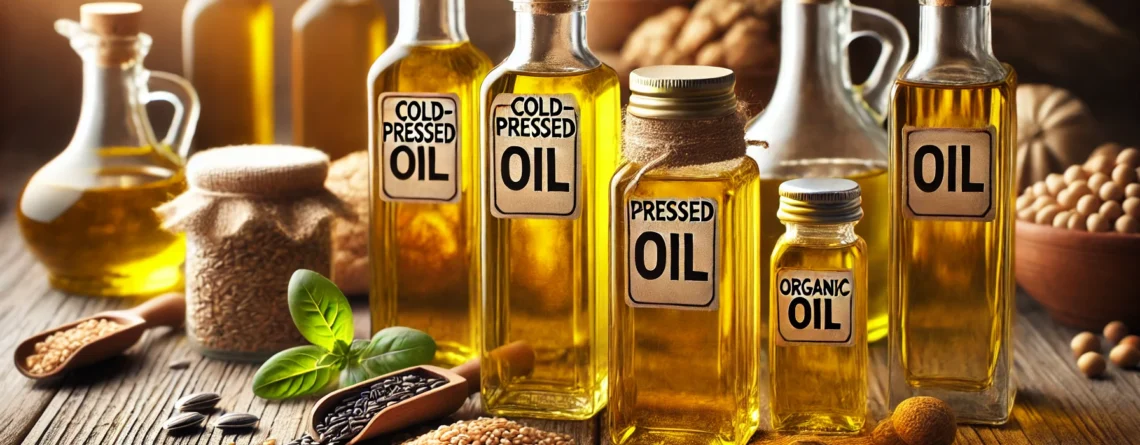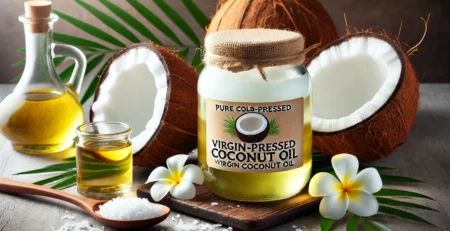The Ultimate Guide to Cold Pressed Oil, Wood Pressed Oil, Refined Oil, and Organic Oil
The Ultimate Guide to Cold Pressed vs Wood Pressed Oil, Refined Oil, and Organic Oil: Differences, Benefits, and Uses
In today’s market, there is an increasing demand for healthy and natural alternatives to traditional cooking oils. Consumers are now paying closer attention to how oils are extracted, processed, and their nutritional benefits like Cold Pressed vs Wood Pressed Oil . As a result, terms like “cold pressed oil,” “wood pressed oil,” “refined oil,” and “organic oil” are becoming common, but they often lead to confusion due to overlapping meanings.
In this comprehensive guide, we will break down the differences, benefits, and uses of each type of oil. Whether you’re looking to make healthier food choices or just curious about the types of oils available, this article will give you everything you need to know.
1. Cold Pressed Oil
What is Cold Pressed Oil?
Cold pressed oil is extracted from seeds, nuts, or fruits using a mechanical pressing method without applying external heat. This method involves crushing and pressing the raw materials at temperatures below 120°F (49°C), which ensures that the oil retains most of its natural nutrients, flavors, and aromas. Cold pressed oils are considered unrefined because they do not undergo additional chemical processing or heat treatment.
Benefits of Cold Pressed Oil
- Nutritional Integrity: Since no heat is involved, cold pressed oils maintain their original vitamins, antioxidants, and essential fatty acids. For instance, cold pressed olive oil retains its high levels of vitamin E, which is known for its antioxidant properties.
- Rich in Healthy Fats: Cold pressed oils are generally rich in monounsaturated and polyunsaturated fats, which are known to support heart health and reduce cholesterol levels.
- Pure Flavor: The absence of heat in the extraction process preserves the oil’s natural flavor and aroma, making cold pressed oils perfect for salad dressings, dips, and low-heat cooking.
Examples of Cold Pressed Oils
- Cold Pressed Olive Oil: Known for its heart-healthy benefits, it is rich in antioxidants and monounsaturated fats.
- Cold Pressed Coconut Oil: Popular for its medium-chain triglycerides (MCTs), which support metabolism and provide energy.
- Cold Pressed Sesame Oil: Used for its anti-inflammatory properties and its ability to boost skin and hair health.
Uses of Cold Pressed Oil
Cold pressed oils are ideal for low-heat cooking, as high temperatures can degrade the beneficial compounds in the oil. They are often used in salad dressings, marinades, dips, and for drizzling over cooked vegetables or grains. Cold pressed oils can also be used for skincare and hair care due to their purity and natural properties.
2. Wood Pressed Oil (Lakdi Ghani or Mara Chekku Oil)
What is Wood Pressed Oil?
Wood pressed oil, also known as Lakdi Ghani or Mara Chekku oil, is extracted using a traditional method that involves crushing the oilseeds using wooden pestles in a wooden press. This method dates back centuries and is widely practiced in rural India. The key difference between wood pressed and cold pressed oil is that wood pressed oil is extracted at an even lower speed, which further reduces heat generation during the process.
Benefits of Wood Pressed Oil
- Traditional and Natural: Since no modern machinery is involved, wood pressed oil is extracted in the most natural and traditional way possible. The slow speed ensures that the oil retains most of its nutrients.
- High Nutrient Retention: Wood pressed oil preserves essential vitamins, minerals, and fatty acids, making it highly beneficial for health.
- Free from Chemicals and Preservatives: Because the extraction process is entirely mechanical and slow, there is no need for chemical additives or preservatives to extend shelf life.
Examples of Wood Pressed Oils
- Wood Pressed Groundnut Oil: Known for its rich flavor and high levels of monounsaturated fats.
- Wood Pressed Sesame Oil: Rich in vitamins and essential fatty acids, widely used in South Indian cooking and traditional remedies.
- Wood Pressed Coconut Oil: This retains the rich aroma and flavor of fresh coconuts and is often used for both cooking and beauty purposes.
Uses of Wood Pressed Oil
Wood pressed oils are versatile and can be used for sautéing, frying, and cooking. They are also widely used in traditional Ayurvedic treatments, body massages, and skin care routines due to their unrefined and pure nature.
3. Refined Oil
What is Refined Oil?
Refined oil is oil that has undergone a series of chemical and mechanical processes to remove impurities, odors, and flavors. These processes typically involve bleaching, deodorizing, and sometimes hydrogenating the oil, which alters its chemical structure and can affect its nutritional content. Refined oils are usually extracted using high heat and chemical solvents, which can strip the oil of its beneficial nutrients.
Benefits of Refined Oil
- Higher Smoke Point: Refined oils generally have a higher smoke point compared to cold pressed or wood pressed oils. This makes them more suitable for high-heat cooking methods like frying or deep-frying.
- Neutral Flavor: The refining process removes much of the oil’s natural flavor and odor, making refined oils ideal for cooking dishes where the flavor of the oil should not interfere with the overall taste.
- Longer Shelf Life: The refining process removes impurities that can cause the oil to spoil, giving refined oils a longer shelf life than unrefined oils.
Examples of Refined Oils
- Refined Vegetable Oil: A blend of various oils that is often used for frying and baking due to its high smoke point.
- Refined Sunflower Oil: Commonly used for frying, this oil is processed to withstand high heat.
- Refined Soybean Oil: Widely used in commercial food production for frying and baking.
Drawbacks of Refined Oil
- Loss of Nutrients: The refining process involves heat and chemicals, which can destroy the oil’s natural antioxidants, vitamins, and minerals.
- Contains Trans Fats: In some cases, the refining process can lead to the creation of trans fats, which are harmful to health and are linked to increased risk of heart disease.
- Chemical Residue: Some refined oils may contain residual solvents or chemicals from the refining process, which can be harmful when consumed over time.
Uses of Refined Oil
Refined oils are best suited for high-heat cooking, such as frying, grilling, and sautéing. They are often used in processed foods, baked goods, and fast food due to their neutral flavor and high smoke point.
4. Organic Oil
What is Organic Oil?
Organic oil refers to oil that is extracted from organically grown seeds, nuts, or fruits. This means that the raw materials used to produce organic oil are cultivated without the use of synthetic pesticides, herbicides, or fertilizers. Additionally, organic oils are typically extracted using cold pressing or expeller pressing methods to maintain their purity and nutritional content.
Benefits of Organic Oil
- Free from Chemicals: Organic oils are free from harmful chemicals, pesticides, and genetically modified organisms (GMOs), making them a healthier choice for consumption.
- Environmentally Friendly: Organic farming practices promote soil health, biodiversity, and reduce the use of harmful chemicals that can pollute the environment.
- Higher Nutrient Content: Since organic oils are minimally processed, they retain more of their natural nutrients, antioxidants, and essential fatty acids.
Examples of Organic Oils
- Organic Olive Oil: Made from organically grown olives and extracted using cold pressing, this oil is rich in heart-healthy fats and antioxidants.
- Organic Coconut Oil: Extracted from organically grown coconuts, organic coconut oil is free from chemicals and retains its natural flavor and nutrients.
- Organic Flaxseed Oil: Known for its high content of omega-3 fatty acids, organic flaxseed oil is a popular dietary supplement.
Uses of Organic Oil
Organic oils can be used in the same way as cold pressed or wood pressed oils. They are suitable for cooking, baking, skincare, and hair care. Due to their pure nature, organic oils are often preferred in health-conscious households for both culinary and cosmetic applications.
Key Differences Between Cold Pressed vs Wood Pressed, Refined, and Organic Oils
1. Extraction Method
- Cold Pressed Oil: Extracted mechanically at low temperatures to preserve nutrients.
- Wood Pressed Oil: Extracted using a traditional wooden press, usually at even lower speeds and temperatures.
- Refined Oil: Extracted using high heat and chemicals, followed by refining processes like bleaching and deodorizing.
- Organic Oil: Extracted from organically grown raw materials, usually using cold pressing or expeller pressing methods.
2. Nutrient Retention
- Cold Pressed Oil and Wood Pressed Oil: Both retain most of the oil’s natural nutrients, antioxidants, and vitamins due to minimal heat exposure.
- Refined Oil: Loses a significant amount of nutrients due to high heat and chemical processing.
- Organic Oil: Retains more nutrients than refined oil, as it is minimally processed, but it may or may not be cold pressed.
3. Flavor and Aroma
- Cold Pressed and Wood Pressed Oils: Retain the oil’s natural flavor and aroma, making them ideal for enhancing the taste of food.
- Refined Oil: Has a neutral flavor and aroma, making it suitable for cooking where the oil should not interfere with the dish’s flavor.
- Organic Oil: Typically retains its natural flavor and aroma, depending on the extraction method
4. Health Impact
- Cold Pressed and Wood Pressed Oils: Known for their high nutrient retention, including vitamins, antioxidants, and essential fatty acids, which are beneficial for overall health, skin, hair, and heart.
- Refined Oil: May contain trans fats and fewer nutrients due to processing, which can lead to increased health risks such as heart disease.
- Organic Oil: Ensures no harmful chemicals or pesticides, promoting a healthier option but its nutritional value depends on the extraction method used (cold pressed or refined).
5. Environmental and Ethical Considerations
Organic Farming Practices
When discussing organic oil, one of the main draws is the environmentally friendly methods used in the cultivation of raw materials. Organic farming focuses on sustainability, biodiversity, and soil health. By avoiding synthetic pesticides and fertilizers, organic farming reduces the impact on surrounding ecosystems, water sources, and wildlife.
Organic oils come with the added benefit of supporting ethical and sustainable farming practices. Many organic oils are also fair-trade certified, ensuring that workers are fairly compensated and work in safe environments.
6. How to Choose the Best Oil for Your Needs
Choosing the best oil depends on your specific needs, whether it’s for cooking, skincare, or general health. Here are some factors to consider:
1. For Cooking
- Cold Pressed and Wood Pressed Oils: Ideal for low- to medium-heat cooking, drizzling, salad dressings, and baking due to their rich nutrient content.
- Refined Oils: Suitable for high-heat cooking like deep-frying and grilling.
- Organic Oils: A great option for those who prioritize purity and sustainability, with options for both cold pressed and refined organic oils available depending on the application.
2. For Health and Nutrition
- Cold Pressed and Wood Pressed Oils: Offer superior health benefits due to their natural nutrients, vitamins, and essential fatty acids. Ideal for individuals focused on heart health, skin, and hair care.
- Refined Oils: Not recommended for those focused on health due to the potential presence of trans fats and the lack of nutrients.
- Organic Oils: Best for individuals looking for oils free from harmful chemicals, pesticides, and GMOs.
3. For Skincare and Haircare
- Cold Pressed and Wood Pressed Oils: Both are ideal for topical applications on the skin and hair, providing deep moisturization, nourishment, and healing properties.
- Organic Oils: If organic standards are a priority for personal care, organic oils ensure the highest purity and safety for your skin and hair.
7. Conclusion: Which Oil is Best for You?
When comparing cold pressed, wood pressed, refined, and organic oils, each type offers unique benefits based on your needs and priorities:
- Cold Pressed Oil: The best option for those looking for nutrient-dense, unrefined oil with high levels of antioxidants and healthy fats.
- Wood Pressed Oil: The traditional and slow extraction process ensures maximum retention of nutrients and flavor, making it perfect for those who prioritize heritage and natural methods.
- Refined Oil: Suitable for high-heat cooking, but not ideal for health-conscious consumers due to the loss of nutrients and potential for trans fats.
- Organic Oil: The best choice for those concerned about environmental impact and chemical-free production, especially when combined with cold pressed or expeller pressing methods.
By understanding the differences between these oils, you can make informed decisions that align with your health, cooking, and ethical values. Whether you opt for nutrient-rich cold pressed oil or the eco-friendly benefits of organic oil, there’s a healthy option out there for everyone.








